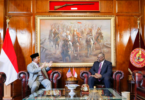F.P. Report
BRUSSELS: The two-day informal meeting of economic and financial affairs ministers held in Brdo pri Kranju and headed by Minister of Finance Andrej Šircelj concluded on Saturday. One issue the meeting addressed was the effect of climate change on the stability of financial systems and what type of fiscal policy would it be good to pursue in the years to come.
Climate change also affects the stability and performance of the economy and financial systems. Dealing with climate change and securing funds for sustainability projects while also ensuring financial stability will be a key task in the upcoming years.
The ministers agreed that the effects of climate change will play a crucial role in shaping policies to manage future risks to the financial system. The financial sector has an important role in tackling climate change, which is why the right initiatives and measures can contribute to creating sustainable financial instruments. “Reducing potential risks is a goal for us all. The financial system will need to be adapted to this and the capital market will need to be improved,” said Minister Šircelj. He firmly believes that this will also lead to more investments.
The ministers also spoke about what kind of financial policy should be pursued in the following years. Since the beginning of the pandemic, both monetary and fiscal policies have played a key role. A country-specific response was made possible with the realisation of the Stability and Growth Pact’s general escape clause, which provided the countries with flexibility in the adoption of measures. Fiscal incentives will continue to be in place in 2022, while discussions are also aimed at the future, when countries will have to gradually reduce their deficit while taking care not to jeopardise their economic recovery after the COVID-19 pandemic. The financing of investments will be another important aspect in the recovery.
Another important aspect for the economy is the issue of adapting corporate tax reform to the digital age. The member countries of the Organization for Economic Cooperation and Development and the G20 did manage to reach an agreement on that this summer. The member states are committed to further harmonisation that would lead to a final agreement on a global level.
The ministers went on to discuss how developed countries could help vulnerable countries in their post-pandemic recovery under an International Monetary Fund project which channels special drawing rights to vulnerable countries. The International Monetary Fund drew up several proposals which were put up for discussion for the ministers. The simplest and easiest option would be to strengthen the existing Poverty Reduction and Growth Trust, while the member countries are prepared to study the option of setting up a new Resilience and Sustainability Trust. Countries’ participation in the channelling of special drawing rights would be on a voluntary basis. Minister Šircelj concluded by saying, “We will continue to discuss this issue, and close cooperation will contribute to the success of the process.”






